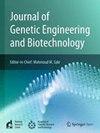In silico drug repurposing for potential HPV-induced skin wart treatment − A comparative transcriptome analysis
IF 2.8
Q3 Biochemistry, Genetics and Molecular Biology
Journal of Genetic Engineering and Biotechnology
Pub Date : 2025-03-29
DOI:10.1016/j.jgeb.2025.100485
引用次数: 0
Abstract
Introduction
Warts are dermal disorders resulting from HPV infection and can be transmitted by direct contact. Existing treatment approaches, such as topical treatment with salicylate, have low efficiency and demonstrate side effects. Thus, the discovery of potent drug treatments for skin warts is necessary. Here we propose the use of alternative medications for the possible treatment of skin warts with the help of comparative transcriptome analysis and drug repurposing approaches.
Methods
Gene expression datasets related to HPV-induced warts and cervical cancer were extracted from the GEO database. Differentially expressed genes (DEGs) were identified using DESeq2 in the Galaxy database. Upregulated DEGs were assessed for druggability using the DGIdb tool. Gene ontology and enrichment analysis were performed to investigate the characteristics of druggable DEGs. A molecular docking virtual screening was conducted using PyRx software to identify potential therapeutic targets for skin warts. The interactions between selected drug candidates and the target protein were analyzed using the BIOVIA Discovery Studio. The physicochemical characteristics of potential pharmaceuticals were evaluated using the SwissADME database. Finally, the molecular dynamics (MD) simulation was performed to validate the stability and dynamic behavior of drug-protein interactions.
Results
Based on the findings from gene expression profiling, Integrin Alpha-X (ITGAX, CD11c) has been identified as a candidate protein that is significantly upregulated in individuals afflicted with skin warts. Integrin Alpha-X plays a crucial role in mediating intercellular interactions during inflammatory processes and notably enhances the adhesion and chemotactic activity of monocytes. Through molecular docking, MD, and physicochemical analyses, it has been demonstrated that dihydroergotamine effectively inhibits the ITGAX protein, suggesting its potential as a therapeutic agent for the management of skin warts.
Conclusion
Dihydroergotamine can be repurposed as a potential drug in the treatment of skin warts by targeting Integrin Alpha-X protein.

为潜在的人乳头瘤病毒诱导的皮肤疣治疗进行硅学药物再利用--转录组比较分析
疣是由HPV感染引起的皮肤疾病,可通过直接接触传播。现有的治疗方法,如水杨酸局部治疗,效率低且有副作用。因此,发现有效的药物治疗皮肤疣是必要的。在这里,我们建议在比较转录组分析和药物再利用方法的帮助下,使用替代药物来治疗皮肤疣。方法从GEO数据库中提取hpv诱导疣和宫颈癌相关基因表达数据集。差异表达基因(DEGs)通过银河系数据库中的DESeq2进行鉴定。使用DGIdb工具评估上调的deg的药物性。通过基因本体和富集分析,探讨可用药deg的特点。利用PyRx软件进行分子对接虚拟筛选,确定皮肤疣的潜在治疗靶点。使用BIOVIA Discovery Studio分析选定的候选药物与靶蛋白之间的相互作用。使用SwissADME数据库评估潜在药物的物理化学特性。最后,通过分子动力学(MD)模拟验证了药物-蛋白相互作用的稳定性和动力学行为。结果基于基因表达谱的发现,整合素α - x (ITGAX, CD11c)已被确定为在皮肤疣患者中显著上调的候选蛋白。在炎症过程中,整合素α - x在介导细胞间相互作用中起着至关重要的作用,并显著增强单核细胞的粘附和趋化活性。通过分子对接,MD和理化分析,已经证明二氢麦角胺可以有效抑制ITGAX蛋白,提示其作为治疗皮肤疣的药物的潜力。结论双氢麦角胺可作为一种靶向整合素α - x蛋白治疗皮肤疣的潜在药物。
本文章由计算机程序翻译,如有差异,请以英文原文为准。
求助全文
约1分钟内获得全文
求助全文
来源期刊

Journal of Genetic Engineering and Biotechnology
Biochemistry, Genetics and Molecular Biology-Biotechnology
CiteScore
5.70
自引率
5.70%
发文量
159
审稿时长
16 weeks
期刊介绍:
Journal of genetic engineering and biotechnology is devoted to rapid publication of full-length research papers that leads to significant contribution in advancing knowledge in genetic engineering and biotechnology and provide novel perspectives in this research area. JGEB includes all major themes related to genetic engineering and recombinant DNA. The area of interest of JGEB includes but not restricted to: •Plant genetics •Animal genetics •Bacterial enzymes •Agricultural Biotechnology, •Biochemistry, •Biophysics, •Bioinformatics, •Environmental Biotechnology, •Industrial Biotechnology, •Microbial biotechnology, •Medical Biotechnology, •Bioenergy, Biosafety, •Biosecurity, •Bioethics, •GMOS, •Genomic, •Proteomic JGEB accepts
 求助内容:
求助内容: 应助结果提醒方式:
应助结果提醒方式:


